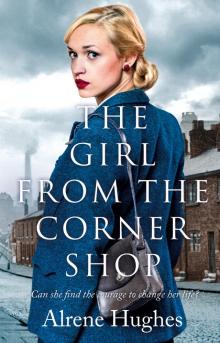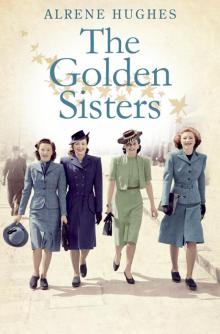- Home
- Alrene Hughes
The Girl in the Pink Raincoat Page 2
The Girl in the Pink Raincoat Read online
Page 2
They wandered through the rose garden, heady with scent, and into a shaded woodland walk. ‘Do you like working at the factory?’ he asked.
‘Not really. Some days I think there’s not much difference between us and them down the road in Strangeways.’
‘Come on! My uncle’s not that hard a taskmaster, is he?’
Gracie pulled a severe face and mimicked her boss: ‘Miss Earnshaw, I don’t pay you good wages for clowning around when there’s raincoats to be stitched.’
Jacob threw back his head and laughed. ‘You should be on the stage, Gracie.’
Back on the main path, Jacob bought them ice-cream cornets and they went to sit on a bench under a chestnut tree. She studied him closely: his dark hair a little longer than most men’s, strong nose and chin and, when he turned to look her, the darkest of brown eyes. ‘I’ve not seen you wearing the little cap before,’ she said.
‘The kippah… Jewish men cover their heads to honour God. I don’t usually wear it, but I’ve just been to shul, that’s my church, for a meeting and, well, it’s expected.’
‘And the way you speak, is that Jewish too?’
‘My accent, you mean?’
Gracie nodded.
‘In a way… I grew up in Germany, but I’ve been back and forward to England every few years, sometimes London then Manchester, learning the family business. I was supposed to go back to Germany a while ago, but…’ He looked away.
‘But what?’ asked Gracie. She saw his jaw tighten and it was a moment before he answered.
‘I wanted to go back, but my parents thought I should stay here. Now is not the time to be a Jew in Germany. As we speak, thousands are fleeing the country, frightened for their lives.’ He shook his head. ‘It’s a bad business.’
Gracie would have asked him to explain, but he looked so sad. After a minute, he checked his watch and his voice was brighter when he said, ‘Come on. It’s almost time for the concert.’
The bandstand was lower down the hill, set in an amphitheatre of grassy banks where people were sitting around, waiting for the music to begin. Jacob took off his sports jacket and spread it on the ground. ‘There you are,’ he said, and they sat down so close together their arms touched.
Besses o’ th’ Barn brass band, resplendent in their uniforms trimmed with gold and red, were straightening their music stands and playing random notes by way of a prelude. The conductor stepped up, raised his baton, and the band members put their instruments to their lips. The baton fell, and the air was instantly full of the rich sound of brass. The programme of patriotic music lifted everyone’s spirits, and at the end of the concert the conductor invited the audience to sing along to ‘There’ll Always Be An England’.
‘Oh, you won’t know the words,’ said Gracie.
‘It doesn’t matter,’ said Jacob. ‘I’m happy just to close my eyes and listen to you.’
The day had turned chilly by the time they left the park and they stood together under the colonnade before they went their separate ways.
‘I’m glad I came out for a walk today,’ said Jacob.
‘So am I,’ said Gracie, and she thought he might kiss her, but then he frowned.
‘Gracie, when we’re back at work tomorrow…’
Instinctively, she knew. ‘I understand,’ she said. ‘I won’t say anything.’
‘It’s just that…’
Gracie touched his arm. ‘It’s all right, don’t worry.’
Jacob took her hand and held it. ‘Thank you. I’ll see you tomorrow,’ he said, and she watched him go.
On the long walk home, her thoughts were full of Jacob. He was nothing like other lads she knew: he was funny and sad, confident and shy and so very, very handsome.
At the bottom of Cheetham Hill, not far from the raincoat factory, she was surprised to see a ragged procession of people walking towards her up the road. Men with long black coats and high-brimmed hats, women in dark clothes with their hair covered, several with a baby tied in a shawl across their bodies. Closer they came, too weary to look about them, carrying bundles or battered suitcases. But it was the sad-eyed children trailing in their parents’ wake that touched her: a little girl in what was once a pretty party dress now ripped and stained; a boy with ringlets hanging in front of his ears and a little round cap on his head.
Gracie’s heart went out to them for she knew at once that they were Jews and they had travelled a very long way to get to Manchester.
Chapter 3
Gracie awoke to the sound of crying, and it was a moment before she realised it was coming through the paper-thin walls of the house next door. Then she remembered it was Friday morning and still Doris had not come to terms with her children being evacuated. She lay for a while, watching a shaft of sunlight coming through the gap in the curtains, and when the crying was replaced by the squeals and laughter of excited children, she got up.
By the time the children were ready to walk to school, a crowd had gathered in the street to see them off. Gracie and Sarah stood next to Doris as she held back her tears, hugged her two little girls and told them to be good and to write every week. An older boy, John Harris, took charge and it was clear that the evacuees had been drilled for this moment. At his command they left their mothers and lined up like little soldiers, with their gas masks and belongings, each with a brown luggage label fastened to their coat. Gracie scanned their faces: some were filled with excitement, others apprehensive; and little Gladys Clark, with no mother to see her off, was sobbing her heart out.
John raised his hand and all eyes turned to him. ‘One… two… three!’ he shouted, and what happened next made the hair stand up on the back of Gracie’s neck – the children began to sing.
‘Farewell to Manchester we’re leaving today,
We need a safe place where we can stay,
Away from the bombs that fall on our heads,
Where we’ll sleep soundly and safe in our beds.’
Off they went, filling the street with the sweet sound of their voices, and all the composure that the mothers had struggled to maintain dissolved in an instant. ‘Heaven’s above,’ said Gracie. ‘I never expected that.’
‘I tell you,’ said Doris, ‘every school in the city has been practising that for the last week. Mine have been singing it every night. Is it any wonder I’m in this state?’
The women waved until the children turned the corner at the end of the street.
‘I can’t believe they’ve gone,’ said Doris. ‘What will I do without them? I could cry me eyes out.’
‘You can’t mope,’ Sarah told her. ‘The best thing is to keep occupied.’
‘Hah, like stitching those bloody blackout curtains, you mean.’
‘Have you not done them yet?’ said Sarah. ‘You know it’s tonight?’
‘I do, but it won’t matter if I haven’t finished them, will it?’
‘Of course it will. Sure you don’t want to be the only house in Manchester showing light when the blackout begins, do you?’
‘Right, I’m off,’ said Gracie. ‘If I run all the way I should get to work before the hooter goes. If I don’t, the boss’ll likely give me my marching orders.’
*
Gracie had kept her word by not telling anyone about meeting Jacob ‒ she had even told an outright lie when Maria asked if she had gone to Heaton Park on Sunday. But as the week went by she had felt distinctly slighted by him. There was no friendly smile when he checked her raincoats and she never once caught him watching her. Then, late on Friday afternoon, she spotted him going into the haberdashery storeroom. She quickly checked that Mr Rosenberg was not on the factory floor, then left her machine. Jacob was up a stepladder at full stretch hauling a box off the top shelf. He had no idea she was there. She couldn’t resist it – a couple of strides to the ladder, and she gave it a shake. It rocked from side to side, Jacob let go of the box to save himself and jumped down. Seconds later they were both showered with horn buttons as big as pennies.
/>
‘Gracie! What did you do that for? I could have broken my neck.’
She laughed. ‘That’ll teach you to ignore me.’
‘Shush.’ He lowered his voice. ‘Nobody must know about us.’
‘Us? Even I don’t know about us,’ she said.
Just then, Mr Rosenberg appeared in the doorway. ‘What’s going on in here?’
‘Sorry, Uncle, bit of an accident. I was getting something from the top shelf and I overbalanced.’ There was a stifled laugh from Gracie.
Mr Rosenberg glared at her. ‘And what are you doing here, Miss Earnshaw?’
‘Well, you’ll never believe it but—’
Jacob intervened: ‘Miss Earnshaw was walking past and she came in to help me pick everything up.’
It was then Mr Rosenberg noticed the buttons all over the floor. ‘A farthing apiece, those best horn buttons – gather them up this instant.’
When he had gone Gracie and Jacob looked at each other and laughed. ‘You’re incorrigible,’ he said.
Gracie wrinkled her nose. ‘Is that good?’
‘No!’ Then he shrugged his shoulders. ‘Well, maybe in your case, yes.’
‘So, you like me, then?’
‘I didn’t say that.’
Gracie pouted and blinked, as if she was going to cry.
‘Oh, Gracie, I’m sorry. Look, I probably shouldn’t say this, but I haven’t stopped thinking about you since Heaton Park. What if I asked you to meet me again?’
Gracie’s smile said it all.
‘Can you meet me on Sunday at seven outside Lewis’s?’ he asked.
‘Where are we going?’
He tapped the side of his nose. ‘It’s a surprise.’
‘All right, I’ll see you then.’ She turned to leave.
He called after her, ‘Where are you going? You have to help me pick up the buttons.’
‘Oh, I think not.’ She laughed. ‘People might talk.’
The raincoat factory closed early on Fridays for the Jewish Sabbath, and because Gracie was the first home, it was her job to make the tea every Friday – always the same meal: meat and potato pie with red cabbage. While the pie cooked she sat on the back doorstep in the sunshine reading a copy of Tit-Bits. She liked the letters page, the stories and the film reviews best. Maybe Jacob would take her to the pictures on Sunday.
‘All right for some who can sit and read, while the rest of us have to slog.’ Sarah stood in the doorway.
‘Never mind, Mam. You’ll get your reward in Heaven and a nice potato pie for your tea.’
Sarah dumped the string shopping bag of library books on the table. ‘I’m jiggered. We’ll have to start reading thinner books.’
‘If you’re tired go and have a lie-down. I’ll shout you when your tea’s ready.’
*
Upstairs Sarah took off her shoes and rubbed her aching feet. She felt drained, but that was more to do with the worry of the letter in her handbag than a hard day’s graft. The postman had given it to her that morning when she’d met him in the street. One look at the handwriting and she’d almost thrown it away unopened, but something had stopped her. After all, she told herself, Jean had been a good friend to her all those years ago when they were growing up in Belfast. They had kept in touch for a while after she had left Ireland and moved to Manchester, but then the letters, Christmas cards and, eventually, the friendship had petered out.
She lay on the bed and tried to clear her mind, but she kept seeing Jean’s face in front of her, looking just as it did all those years ago when they were girls together. ‘Oh, for goodness’ sake, just read it!’ said Sarah, out loud. She took the letter from her bag and tore it open. Typical of Jean, the letter was short and straight to the point. As she read it, she could hear her friend’s voice in that long-forgotten Belfast accent. ‘Your da is dying and he’s asking for you.’
Sarah went to the window and looked out over the rooftops and chimney pots. This was where she had built her life, surrounded by good friends and neighbours. The girl who had left Belfast all those years ago didn’t exist anymore and, in her mind, neither did the people she had left behind.
Just then Gracie called from the bottom of the stairs that the tea was nearly ready, and she shoved the letter back into her handbag.
‘When are we putting up the blackout curtains?’ asked Gracie, as she dished up the pie.
‘Well, the streetlights will come on at the same time as last night, just before nine o’clock,’ Sarah explained. ‘So the sooner we get them up the better. Then we’ll switch on the lights in the house and go outside to wait for the blackout so we can check there’s no light showing.’
‘I heard everybody in the street’ll be outside waiting for the moment when the lights go out. It’s so exciting,’ said Gracie. ‘They say you won’t be able to see your hand in front of your face.’
‘I don’t know why you’re making such a drama out of it,’ said Sarah. ‘We’re going to be without any streetlights for God knows how long, and by the end of next week you’ll wish you’d never heard of the blackout.’
Just before nine the neighbours were outside. After a few minutes the lights came on and everyone cheered. It was a balmy evening and they stood around chatting while they waited for the practice blackout. There was plenty of banter about what might happen in a blackout, and Billy from the tripe shop on the corner was telling the sort of music-hall jokes that weren’t suitable for mixed company.
It was nearly ten o’clock before Doris appeared. ‘Did you get your curtains sorted?’ asked Sarah.
‘Did I ’eck as like!’ Doris’s voice was strained. ‘And that Lily Roper says anybody showin’ a light’ll be put in jail.’
‘Not on the first night they won’t. They’re just trying to get us used to it. Anyway, if your curtains aren’t right I’ll—’
Suddenly they were plunged into darkness: Doris screamed; some people laughed; others cheered. But within half a minute all sound had ceased and the people of Pearson Street looked upwards to a sky as black as a coal shed. Slowly, their eyes adjusted to the darkness and they began to distinguish shapes. It was then that a reedy voice, instantly recognisable as that of Albert, Sarah’s next-door neighbour, began to sing, ‘“Pack up your troubles in your old kit bag…”’ and everyone joined in. At first, they didn’t see the thin beam of light at the bottom of the street, but the piercing whistle drew their attention. They could discern only the dark outline of a man carrying a torch, shaded so the light fell downwards. ‘What’s all this noise?’ he shouted.
‘Is that you, Ted?’ said Billy.
‘Aye, it is and I’m here to tell you there’s lights showing at the back of three houses in this street. The ginnel looks like a landing strip. You’d better get them seen to or I’ll have to report you to the peelers.’
‘For Christ’s sake, why would you do that?’
‘Because it’s my responsibility as ARP warden to make sure you lot observe the blackout regulations.’
‘Trust you to be first in the queue to throw your weight around,’ said Billy.
‘And trust you to talk tripe like you sell in your shop!’ Ted stalked off, taking the light with him.
Billy laughed. ‘Anyone fancy a pint down the Foresters, if it hasn’t been commandeered for Ted’s headquarters? Come on, Sarah, I’ll treat you to a port and lemon in the snug.’
‘Not tonight, Billy, but can you do me a favour and remind the landlord that the women will be there early in the morning to clean out his mucky cellar.’
‘I will, that’s if I can find my way there in the dark.’
‘I’m sure you’ll manage it,’ said Sarah. ‘Just follow the smell of beer.’
*
Sunday morning dawned bright and clear, but Sarah’s spirits were low with the thought that the country could be at war by the end of the day, not to mention the ache in her back from all her efforts yesterday at the pub, clearing out rubbish and scrubbing away the dirt and grime o
f decades.
She had just finished her wash at the sink when there was a knock at the door. It was Albert, looking shaved and well-scrubbed, wearing a collarless shirt and his funeral suit all shiny at the elbows. ‘Just been to the paper shop for me News of the World and they told me the prime minister is to speak on the wireless at quarter past eleven this morning.’ He sucked on his few remaining teeth. ‘It doesn’t bode well, if you ask me. Thought I’d let you know that the pub will be open if you want to hear what he’s got to say?’
Sarah sighed. ‘What’s to become of us, Albert?’
‘Chin up, lass. We gave the Hun a bloody nose last time and we can do it again. I’ll see you down there.’
The smell of breakfast cooking was enough to get Gracie out of bed. ‘Ah, you can’t beat bacon and egg on a Sunday. Who was that at the door? They woke me up.’
Sarah handed her the breakfast, then set the teapot on the table and covered it with a cosy. ‘Albert,’ she said, and cracked another egg into the pan. ‘Letting us know there’s going to be an announcement on the wireless about the war. So, when you’ve had your breakfast, get ready and we’ll go to the pub and hear what Mr Chamberlain has to say.’
‘Do I have to?’ Gracie moaned. ‘I want to wash my hair. I’m going out tonight.’
‘Oh? And where are you going?’
Gracie giggled. ‘Guess.’
Sarah was busy with the egg and the spitting fat. ‘Gracie, just tell me, will you?’
‘I’m meeting Jacob Rosenberg.’
Sarah took the frying pan off the gas and turned to face her daughter. ‘Is that wise?’ she said.
‘What do you mean?’
‘Well, you know… different religions and all that.’
‘For goodness’ sake, Mam, it’s just a date.’
‘Hmm. Well, don’t say I didn’t warn you.’ She slid the egg on to her plate. ‘Anyway, you can wash your hair later, so you can. It’s important to hear what the prime minister has to say this morning because it’ll change our lives and I want you to know why. So, no arguments, you’re going.’
*
The Foresters Arms was a red-brick building on a corner plot. Inside there was the vault where the men drank, no women allowed, and a snug where women and men could drink together. The wireless sat on the bar between the two. The snug was chilly, despite the sunny day outside, and the smell of stale tobacco hung in the air. Sarah and Gracie nodded to the few women already there and sat down at a table. Mary, the landlady, made them welcome with a spread of sandwiches and cups of tea from a large tin pot. ‘It’s the least I can do after all your hard work in the cellar yesterday,’ she said.

 The Girl from the Corner Shop
The Girl from the Corner Shop Martha's Girls
Martha's Girls A Song in my Heart
A Song in my Heart Golden Sisters
Golden Sisters